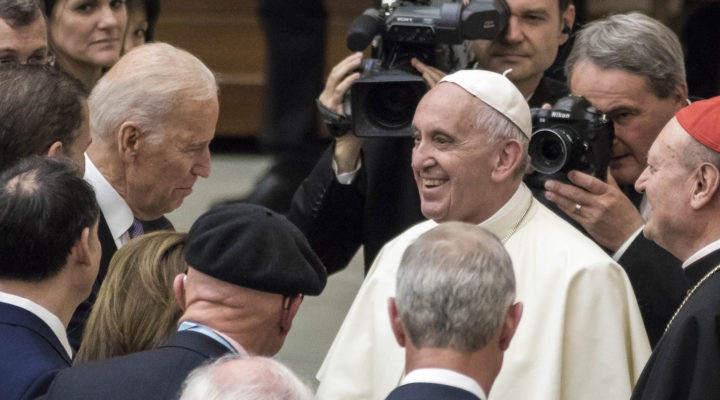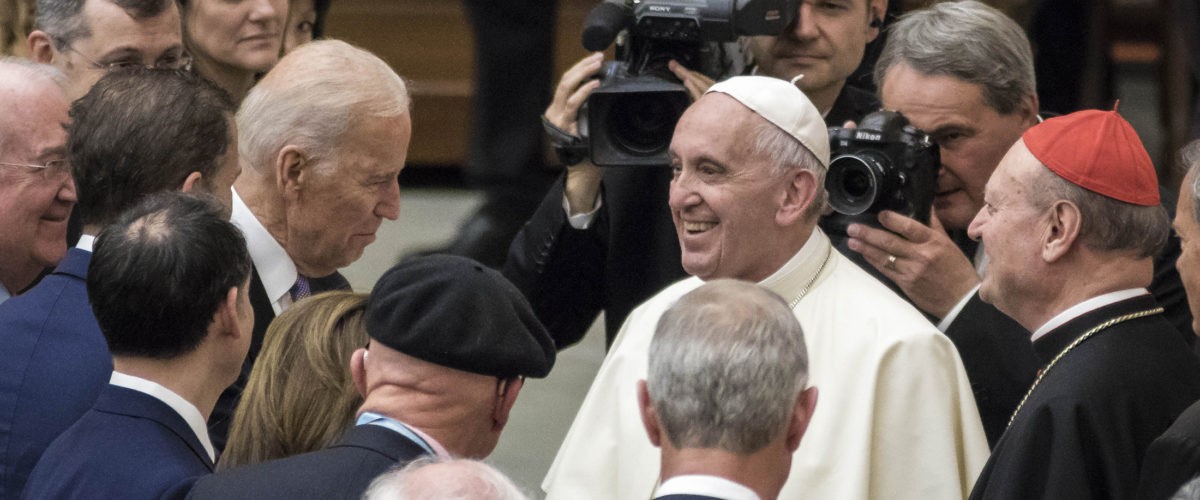The first time Americans elected a Catholic as president, Baptists were among those expressing alarm over possible violations of church-state separation. This year, with the imminent inauguration of President-elect Joe Biden as the nation’s second Catholic president, the landscape looks vastly different.
Virtually nowhere in the debate during the 2020 election was concern raised by Baptists or anyone else about Biden being loyal to pope over country — the primary charges leveled against John F. Kennedy in 1960. Instead, Baptists are now starkly divided in their views of what church-state separation actually means, and the pope is not the threat he once seemed to be.
Redefining religious freedom
Biden supporters — mainly in the moderate to progressive wing of Baptists — remain staunch separationists but see the greatest threat today not from the Vatican but from a Republican Party that has perpetuated a different definition of religious liberty.
Beginning with Ronald Reagan in 1980 but especially during the last four years of the Trump administration, more conservative and fundamentalist Baptists have emphasized their own ability to freely exercise religion rather than protecting religious expression for others. This brand of Christianity elevates the Free Exercise Clause of the First Amendment over the Establishment Clause (“Congress shall make no law respecting an establishment of religion”).
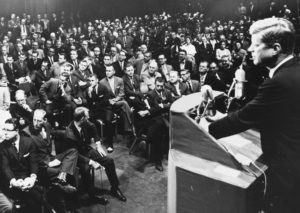
Sen. John F. Kennedy in question and answer session on religious issues with Ministers’ Association of Greater Houston at Rice Hotel in Houston, Sept. 12, 1960. (AP Photo/Houston Chronicle)
In 1960, it was potential violation of the Establishment Clause that gave Baptists concerns about Kennedy. The fear was that a Catholic president would be submissive to the pope, thereby establishing Catholic theology, morality and politics over all other religious expressions in America.
W.A. Criswell, legendary pastor of First Baptist Church of Dallas, thundered from his pulpit against Kennedy in 1960, saying the election of a Catholic president would “spell the death of a free church in a free state.”
In her history of the church-state group BJC — known in the 1960s as Baptist Joint Committee on Public Affairs — Pam Parry reports that the 1960 presidential race “posed a unique problem.” She adds that “BJC was among those concerned about Sen. John F. Kennedy’s church-state views. On the other hand, the BJC always had stood against religious bigotry and supported the Constitution’ prohibition against using religious tests as measures of a candidate’s fitness for public office.”
Emanuel Carlson, then executive director of BJC, met with Kennedy one-on-one for 30 minutes Aug. 24, 1960. Parry reports that the two agreed that “a frank renunciation by all churches of political power as a mean to religious ends would greatly improve the political climate.” She also reports that Kennedy subsequently publicly announced his opposition to appointing a U.S. ambassador to the Vatican, his opposition to public financial aid for parochial schools and his support for church-state separation.
Kennedy’s commitment on separation was so impressive to BJC staff and directors that in 1961 the board passed a formal resolution commending Kennedy on the matter.
Concern over appointment of an ambassador to the Vatican was laid aside during the Kennedy years and did not surface again until the administration of Richard Nixon, a Quaker.
How the times have changed
Brent Walker, former executive director of BJC, said today’s political and religious landscape is, indeed, vastly different than 1960.
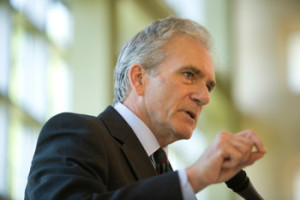
Brent Walker
“Nobody has said anything about Biden’s Catholicism. It’s a non-issue,” he explained. We’ve got seven sitting justices on the Supreme Court who are Catholic … and nobody’s sounding a peep over that.
“Whatever we’ve not done or fallen short on in educating the public about religious liberty and separation of church state, we’ve done a good job of educating about the no religious test issue,” he added.
In a sure sign of changing times, even “evangelicals don’t seem to be too concerned about Biden’s Catholicism,” Walker said. “And they probably shouldn’t be because they also don’t seem to care about Trump’s lack of religious commitment.”
In a further sign of how the landscape has changed, more conservative Baptists today have joined with evangelical Christians and Catholics to push for more federal money to help private and parochial schools. Yet once again, a Catholic president will be among those pushing back on such efforts, just as Kennedy did in the early 1960s.
Kennedy was elected president 13 years before the Supreme Court’s Roe v. Wade decision legalizing abortion.
Kennedy was elected president 13 years before the Supreme Court’s Roe v. Wade decision legalizing abortion, so abortion was not the party-defining political battle it is today. Now, abortion is the single area of greatest political interest among Catholic congregants in the U.S. And the nation’s soon-to-be second Catholic president differs from his own church’s teaching on this issue.
In another sign of the changing landscape, no one seems to worry that Pope Francis will unduly influence the Biden administration on abortion.
Diplomatic relations with the Vatican
Biden also will enter a global political scene starkly different than what greeted Kennedy in 1960. One of the primary differences is that the U.S. now has formal diplomatic relations with the Vatican.
Vatican City, also known as Vatican City State, is an enclave within the city of Rome. It is considered a sovereign state but with open borders into Rome. That invisible boundary line, however, is so clearly understood that it presented a problem for Adolf Hilter, who during World War II wanted to capture or assassinate priests who were shielding Jews from the Holocaust, but even he knew he could not cross that line.
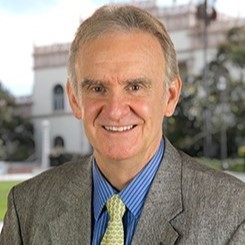
Samuel W. Bettwy
A 1984 article in the The Catholic Lawyer by Samuel W. Bettwy explored the history of the Vatican as a diplomatic state throughout the ages. Bettwy described the Vatican as having “dual character” as both spiritual and secular (or “temporal”) influence. “If we imagine a spectrum of influence with spiritual at one end and temporal at the other, the Vatican has run the gamut at various times in its history,” he noted.
Bettwy explained: “Vatican City, with a transient population of about 800 people, certainly does not embody the concept of a modern nationalistic state, reflecting the ideals of some secularism. Nonetheless, in practical terms, Vatican City does provide the pope, as head of the church, with an independent territorial base from which he can administer the church free of any secular power.”
From a Catholic perspective, the dual roles of secular and sacred power should not be problematic, Bettwy said. “As a spiritual influence, the Roman Catholic Church is supreme; as a temporal influence, it maintains a diplomatic corps under the title ‘the Holy See,’ which participates in discussions of world politics with other nations on a one-to-one basis and in the context of international organizations.”
Yet the Holy See and Vatican City — like the Catholic Church at large — are both run by the pope.
A ban on ambassadors
In 1788, Pope Pius VI made a request to Benjamin Franklin to ask if George Washington might be OK with the appointment of a Catholic bishop in the United States. Washington said the pope was free to name whomever he wanted because the newly formed United States was founded with a belief in religious freedom for all.
From 1870 to 1984, the United States did not have diplomatic relations with the Holy See.
The U.S. Department of State reports the history from there: “The United States maintained consular relations with the Papal States from 1797 to 1870 and diplomatic relations with the pope, in his capacity as head of the Papal States, from 1848 to 1868, though not at the ambassadorial level. These relations lapsed in 1870 with the loss of all papal territories during the unification of Italy. … From 1870 to 1984, the United States did not have diplomatic relations with the Holy See.”
That was because in 1867 — probably spurred by concerns about Catholic immigrants from Europe coming en masse to America — Congress adopted a law prohibiting funding for diplomats to the Holy See.
In 1939, President Franklin D. Roosevelt appointed a personal representative, Myron Taylor, to Vatican City. Then in 1951 President Harry S. Truman — a Baptist — discontinued this contact and withdrew the nomination of an ambassador to Vatican City.
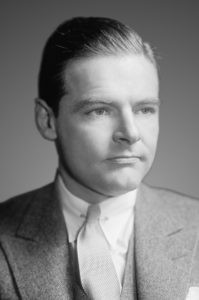
Henry Cabot Lodge Jr.
Fast forward nearly 20 years, and in 1970, President Nixon named Henry Cabot Lodge Jr. as an “occasional visitor” to the Vatican. That didn’t go over well with Baptists and other separationists. And then President Jimmy Carter — himself a separationist and Southern Baptist — named David Walters as an “envoy” to the Vatican in 1977.
In late 1983, Indiana Sen. Richard Lugar and Wisconsin Rep. Clement Zablocki introduced legislation that would end the ban on U.S. ambassadors to the Holy See. Reagan then nominated a land developer friend from California, William A. Wilson, to be the first ambassador.
On Dec. 12, 1983, the New York Times reported on opposition to the Reagan administration’s plan: “Rarely has such an issue summoned with such a unified response from those all along the religious spectrum. Standing together at a news conference to oppose formal relations were officials of the National Council of Churches, the National Association of Evangelicals, the Seventh-day Adventists, the Baptist Joint Committee … and Americans United for the Separation of Church and State.”
In March 1984, the Christian Science Monitor reported on Wilson’s confirmation, noting the Senate vote was 81 to 13.
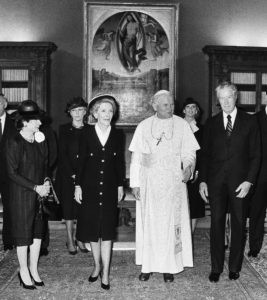
Pope John Paul II is flanked by Nancy Reagan and U.S. Ambassador to the Holy See William Wilson on May 4, 1985, in Vatican City. (AP Photo)
“With a strong nudge from the president, Congress last year repealed an 1867 statute that banned the use of federal funds for a U.S. mission at the Vatican,” the paper reported. It added that Sens. Mark Hatfield of Oregon, John East of North Carolina and Dale Bumpers of Arkansas spoke against Wilson’s confirmation.
“’I cannot see how one could have the grave concerns that I have about the prayer-in-school debate … and at the same time agree to expenditures of public funds literally recognizing a particular religion,” Bumpers said.
James Dunn, then executive director of BJC, was quoted as saying: “I am saddened by the likelihood that many senators who did understand the gravity of this action were probably intimidated by political pressures and the fear of being thought anti-Roman Catholic, when the issue was far more one of principle than a division of sentiment about any particular church. … This is a truly tragic day in the history of American church-state relations.’”
The state of U.S.-Vatican relations today
Typically, ambassadors who are political appointees and not career diplomats tender their resignations when the president who appointed them leaves office, and the incoming president then nominates new ambassadors. Such a process already is under way behind the scenes with this month’s change in administrations.
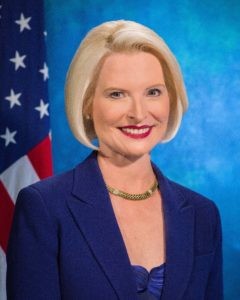
Callista Gingrich
The current U.S. ambassador to the Holy See is Callista Gingrich, a lifelong Catholic and third wife of former Speaker of the House Newt Gingrich. She is the 11th U.S. ambassador to the Holy See and began serving in December 2017.
A December article in America magazine, a Catholic publication, offered an assessment of what U.S.-Vatican relations could look like in a Biden administration.
“The quality of the potential collaboration between the Holy See and the Biden administration will depend on the president-elect’s choice of ambassador and the trust the president and the secretary of state have in the appointee,” wrote Drew Christiansen, distinguished professor of ethics and human development at Georgetown University and a senior fellow with the Berkley Center for Religion, Peace and World Affairs. “The incumbent, Ambassador Callista Gingrich, was clearly a political appointee often overshadowed by her outspoken husband.”
Georgetown’s Berkley Center sponsored a Dec. 4 forum titled “Rethinking United States and Vatican Diplomacy.” Shaun Casey, a professor in the School of Foreign Service and director of the center, had some advice for Biden, as reported by the National Catholic Reporter.
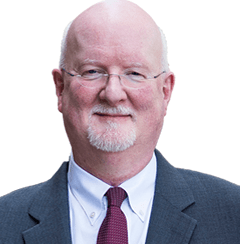
Shaun Casey
Casey argued that making a “political” appointment to the Vatican ambassadorship should be subordinate to appointing a career diplomat to the post, the online journal said. “It will insulate them (the Biden administration) from the culture wars in the American Catholic Church if you pick a career diplomat.”
And the right person might be a non-Catholic, he added. “I think the Vatican will accept a non-Catholic. They’re not so concerned about the theological status of the incumbent in the position” as the credentials.
What will be the agenda?
There’s a lot of work to be done — and a lot of repair to be done — in U.S.-Vatican relations, observers have said. Pope Francis, for example, has not been a fan of Trump’s “America First” platform.
There’s a lot of work to be done — and a lot of repair to be done — in U.S.-Vatican relations.
Also, Trump’s current secretary of state, Mike Pompeo, has publicly jabbed the Vatican about its 2018 agreement with China, creating more enemies in Vatican City than allies.
The Vatican has diplomatic relations with 183 nations, and the United States could use the Vatican as a resource for restoring frayed international relationships, noted Cathleen Kaveny, professor of theology and law at Boston College, speaking at the Georgetown seminar.
That sentiment was echoed by Christiansen, who also is a Jesuit priest: “The world is ready for the United States to come back into international affairs and international collaboration.”
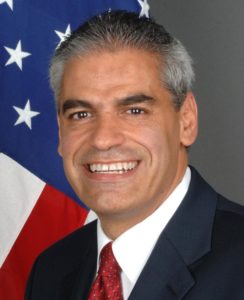
Miguel H. Díaz
Miguel H. Díaz, who served as the ninth U.S. Ambassador to the Holy See after appointment by Barack Obama, wrote a piece addressing all these issues in the National Catholic Reporter in December.
He laid out several likely objectives:
- Re-engaging U.S. relations with Cuba. Francis is the first Latin American pope and has been an advocate for international dialogue with Cuba. Obama had normalized U.S relations with Havana, but the Trump administration reversed that. Díaz said he believes it is possible Biden will name a U.S. ambassador to Cuba who will be confirmed by the Senate.
- Focusing on global health. “The Biden-Harris administration presents a timely moment to cooperate with the profuse soft power of the Holy See to address the biological and social viruses that threaten our human family, especially those who are most vulnerable,” Díaz wrote.
- Rejoining the World Health Organization.
- Rejoining the Paris Climate Accord.
- Addressing racism worldwide and at home.
- Creating more humane policies related to immigration and global migration.
In his piece in America magazine, Christiansen also articulated much of what Díaz suggested.
“There is much on which a Biden administration and the Holy See can collaborate. President-elect Joe Biden and Pope Francis share many policy concerns, above all climate change, where Mr. Biden has pledged to re-join the Paris Climate Covenant,” he noted.
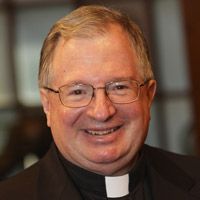
Drew Christiansen
The pope is concerned for refugees and migrants, Christiansen added, and Biden “has expressed his opposition to the Trump administration’s harsh, even cruel, treatment of Central American refugees at the U.S.-Mexico border and his desire to address the backlog of admissions and to regularize the asylum process.”
Biden and the pope also share a concern for addressing poverty and income inequality, he added. “In announcing his new economic team, the president-elect has likewise affirmed his intent to reduce economic inequality and empower workers, a perennial concern of Catholic social teaching.”
On a broader level, Christiansen argued, Biden’s relationship with the pope and better U.S. relations with the Vatican overall could help the U.S. return to its leadership role on the world stage — a role rebuked and reviled by Trump.
“The Holy See, with its principled commitment to multilateralism, can also provide wise counsel on how to re-engage in global affairs without appearing overbearing,” Christiansen wrote.
He acknowledged that relations with China will be a thorny problem. But even there, the Vatican has help to offer the U.S., he suggested: “Much like China, the Vatican thinks in centuries. In that spirit, the Holy See has shown how persistence can succeed in relations with a wary China. Persistence is too little valued in the United States, which favors urgent action it soon forgets.”
Related article:
This year’s tug of war over the Catholic vote and why it matters

